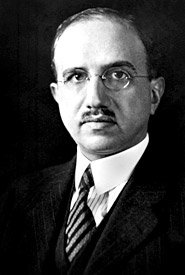Nearly a decade ago, Jeffrey Friedman from Rockefeller University pulled a copy of The Discovery of Insulin by Michael Bliss from a shelf and began to browse. In these pages, he read about four Canadian researchers, Frederick Banting, Charles Best, James Bertram Collip, and John James Macleod, who demonstrated in 1922 that insulin isolated from cow pancreas could be used to treat diabetes, a disease that was a death sentence at the time.

Israel Kleiner
As a metabolism researcher himself—Friedman shared the 2010 Lasker Award with Douglas Coleman for discovering the appetite-regulating hormone leptin—he was fascinated by the story. But what caught his attention was learning that another researcher from the Rockefeller Institute, Israel Kleiner, had recognized insulin and its potential for people with diabetes years earlier and had even published a paper showing that the hormone could treat diabetes in animals. “In 1919, for reasons that were unknown, his work abruptly ceased,” Friedman said. “I decided to try to find out why.”
For the next 10 years, Friedman combed university archives and searched online in his spare time, encountering several roadblocks along the way. Finally, he tracked down Kleiner’s daughter and grandsons, who helped fill in the gaps with recollections and personal letters. With this break in the story, Friedman devoted himself nearly full time to historical research for a few months.
Friedman recently detailed the results of his research in Harper’s Magazine, revealing Kleiner’s early work in determining that a failure of the pancreas causes diabetes and that pancreatic extracts could neutralize glucose in the blood of diabetic animals. To prove his case, Kleiner needed to travel to Europe to learn how to perform new experimental methods for studying glucose metabolism. While he was traveling, Archduke Franz Ferdinand was shot in Sarajevo, kicking off World War I, and prematurely ending Kleiner’s trip. Kleiner’s collaborators diverted their efforts to war hospitals and antiwar organizations while Kleiner continued his research alone. But then the war redirected his career, too, when his laboratory was closed.
“Kleiner, a research scientist who missed out on a great discovery, is not the sort of person about whom stories are often written,” Friedman wrote. “But an understanding of what thwarted him offers insights into the nature of discovery, insights relevant to challenges and opportunities facing science today.”
‘

Jeffrey Friedman
According to Friedman, his foray into historical research and the details of Kleiner’s story gave him a more balanced perspective and greater patience for the nature of discovery. While Kleiner certainly had the talent and insight needed to develop the first treatment for diabetes, his personality, the political environment in the world and at his institute, and the doors that opened and closed as the war played out all wove together to interrupt his discovery.
“I view knowledge as an arc,” Friedman said. “Understanding the elements that lead to a discovery can help give one a better sense of what the next advances will be. It also makes clear that what we fund when we support science is the accretion of knowledge. It is from this new knowledge, some of it profound and others less so, that discoveries come.”
